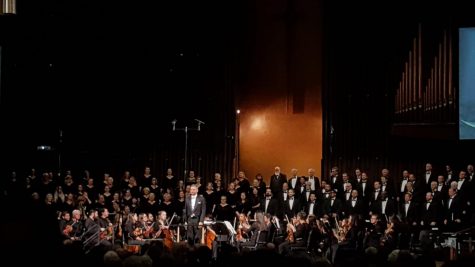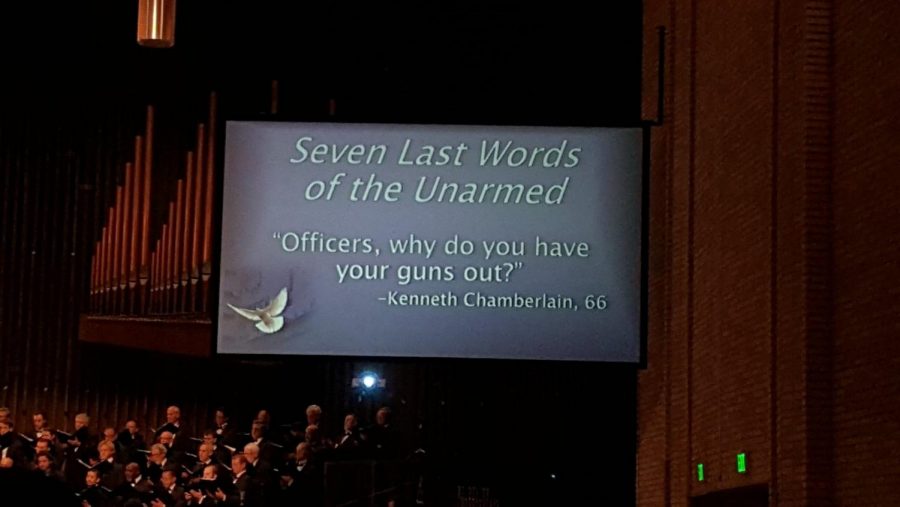
“Truth and Reconciliation” engaged the community in discussions of discrimination, loss and healing with the help of San Diego State’s Symphony Orchestra.
The event was held on Oct. 19 at the College Avenue Baptist Church in collaboration with the San Diego Master Chorale.
At 6:30 p.m., orchestra conductor Michael Gerdes, chorale conductor John K. Russel, composer Joel Thompson and Africana Studies lecturer Bonnie Reddick participated in a pre-concert discussion. The concert began at 7:30 p.m.
The program opened with Thompson’s “Seven Last Words of the Unarmed,” setting the last words of seven unarmed black men who were killed by police to orchestral music accompanied by the choir.
Thompson was inspired by journalist Shirin Barghi’s #LastWords project in which Barghi drew illustrations to accompany the last words of several Black men killed by police.
“Seven Last Words of the Unarmed wasn’t written to be heard,” Thompson said. “It was essentially a sonic diary entry expressing my fear, anger and grief in the wake of this tragedy.”
Thompson said he was motivated to tell this story in the form of classical music to reach a different demographic than he might have with another genre.
The piece features the last words of 66-year-old Kenneth Chamberlain, 16-year-old Trayvon Martin, 23-year-old Amadou Diallo, 18-year-old Michael Brown, 22-year-old Oscar Grant III, 22-year-old John Crawford III and 43-year-old Eric Garner.
In the first movement, the choir sang Chamberlain’s last words, “Officers, why do you have your guns out?” while the orchestra’s somber tunes flowed throughout the church.
The second movement began with orchestral music emulating the panic and anxiety of Martin’s last words, “What are you following me for?”
Diallo’s last words, “Mom, I’m going to college,” are featured in the third movement. The choir angelically sang his words, welcoming a soloist to begin and end the movement.
In the fourth movement, the orchestra exploded in trepidation while the chorus sang Brown’s last words, “I don’t have a gun, STOP!” The chorus repeated “stop” louder and louder before seamlessly transitioning to the next movement.
Grant III’s last words, “You shot me,” opened the fifth movement. The first violinist played short notes, imitating a lifeline, and chorus members hit their chest, imitating a gunshot. The chorus sang the last words in rounds, still hitting their chest and shouting in agony, until the entire group joined in a whisper.
Angelic themes returned in the sixth movement, featuring Crawford III’s last words, “It’s not real.” The lifeline remained prominent throughout, eventually slowing at the end.
The piece ended with Garner’s last words, “I can’t breathe.” The chorus began as a whisper and grew louder, holding every line until singers lost their own breath.
“The way (the phrases) worked together with the music was really powerful,” history sophomore Jake Frautnick said. “My jaw dropped. It was really impressive, the way they put it together.”
Frautnick said although he didn’t know what to expect, he was glad he went.
“Hearing their final words in a song was like, wow,” he said. “These people and their families had someone very important to them stripped away from them too soon.”
The concert quickly transitioned to “Glory” from the movie “Selma,” arranged by Eugene Rogers. The triumphant tones offered reprieve from the opening’s tragic themes.
Master Chorale conductor John K. Russel then officially introduced the next section of the concert.
“It means a great deal to us that you’re here supporting live music,” he said. “This program was developed by myself and my colleague and it is meant to help you reflect, reconcile with some pretty difficult truths that you heard in the first piece.”
The next piece, “Abendlied,” or “Evening Song,” by Joseph Rheinberger lyrically asked the audience to persist through the remainder of the concert. It was sung in German with an English translation in the program.
Then, SDSU Symphony Orchestra conductor Michael Gerdes took the stand for “Mother of the Man,” by John Adams.
After intermission, Russel took the stand again for “Son to Mother,” a poem by Maya Angelou. The chorus sang her verses in enchanting harmony with the orchestra.
“‘The ‘Seven Last Words of the Unarmed’ was showing us that not all human relationships are loving and nurturing,” viola player, orchestra member and music education sophomore Dayne Sakazaki said. “To play those pieces, ‘Mother of the Man’ and ‘Son to Mother,’ really accentuated that lack of love and compassion.”
They transitioned to “Visions of Peace” by Jean Berger, compiled of excerpts of the Bible’s “Isaiah.”
The next piece, “Litanies à la Vierge Noire,” or “Litany to the Black Virgin,” was sung in French with an English translation in the program.
The concert ended with a blessing in the form of “Benedictus,” by Jocelyn Hagen from her collection “amass.”
“I’m very honored that I was able to be a part of something like that,” Sakazaki said.
Sakazaki said he hopes the audience will think about not only themselves but also their relationship to the world and how they’ll act in the future.
“This whole program was about starting a conversation about this topic of violence and discrimination and then providing a space for all of us … to reflect on that,” he said.







